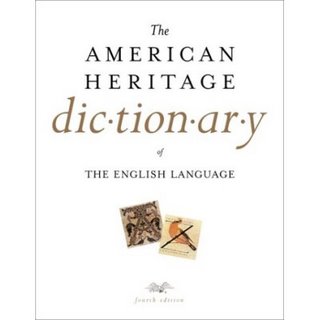
For those of us who not only read but USE our books (writing, editorializing, translating, researching ... the verb-parts of reading), there's an unsung group of heroes on our shelves.
They're not first editions. They're not autographed. They don't come in attractive sets with calfskin bindings. They're not even the books we go to for pleasure, in most cases.
But they're essential, and it's high time they were given some of the praise that's their due.
Of course I'm talking about our reference books. That extremely well-thumbed and heavily bookmarked half-shelf to whole-shelf of books we keep not attractively displayed but RIGHT THERE, at arm's length from where we do our writing.
We THINK about all our other books far more often than we do these old workhorses. We move all the others around, change their order for aesthetic reasons. We handle them lovingly and are inwardly proud when our guests do likewise.
The reference shelf is different. Those books seldom get SEEN by guests, much less shown to them. But what they lack in glamor they make up in an intimacy for which all our other books envy them: we handle them virtually every day. I have a very attractive two-volume slipcased "Man Without Qualities" on my living room shelf. I haven't touched it in six years.
I've used my battered American Heritage Dictionary (4th edition) three times in this entry alone.
I'm not proposing calfskin and better lighting for these volumes - far from it! They need to be within arm's reach and well-used, because we need them to get our brains fully dressed before we show our stuff to anybody else. That shelf, alone among our books, can't support any peacocks.
What I AM proposing is that we all pause for a moment and THANK these books, these essential props who've taught (and continue to teach) us so much.
So go over to your shelf, if you have one - that particular place (probably near where you work), and jot down the titles, and share them with me and everybody here! Then we can all go back to our Folio Society volumes and our first editions.
Here's mine:
The American Heritage Dictionary, 4th edition
The Oxford Companion to English Literature, 4th edtion, edited by Margaret Drabble
The Oxford Book of English Verse - the Helen Gardner edition
Biblical Literacy by Rabbi Joseph Telushkin
The Ocean Almanac by Robert Hendrickson
Tudor England by John Guy
History of the World by J.M. Roberts
Animal by DK and the Smithsonian
The King James Bible
The mighty Oxford Classical Dictionary
The Chambers Biographical Dictionary, both the current edition and the previous one
The Riverside Shakespeare
and the National Geographic World Atlas
These old friends I thank one and all. Now let's hear yours!

6 comments:
Moi keeps our, well worn, "The Randon House - College Dictionaïry"
right by the PC.
Stay on Groovin' Safari,
TOR
From Jeff E.:
The New Shorter Oxford English Dictionary (2 vol, 1993)
The American Heritage Dictionary, 3rd edition (for bedside consultation)
Total Baseball, 7th Edition
Creative Photoshop Lighting Techniques by Barry Huggins
Teach Yourself Dreamweaver MX 2004 by Warner Gardner
Dr. Bernstein's Diabetes Solution by Dr. Richard Bernstein
The MERCK Manual of Medical Information, 2nd Home Edition
The Atlas of Human Anatomy by Frank Netter, MD
The Color Atlas of Human Anatomy, 5th edition
From John Cotter:
Then there's that odd second catagory: books that you keep intending to use all the time, but never actually end up using. In my case that list contains Larouse's English-French Dictionary, and Fowler's "Modern English Usage." And the Chicago Manual of Style. I literally never touch it.
Of the books that I do use all the time, here are a few trusted friends:
The New Shorter Oxford English Dictionary (same edition as Jeff E.)
The Norton Anthology of World Poetry, ed. Major, Washburn (1998)
Chambers Biographical Dictionary (whichever edition you gave me, Steve)
J.M. Roberts History of the World
The Cambridge Dictionary of Philosophy (ed. Robert Audi)
The Oxford History of the American People (in one heavy volume) by Samuel Eliot Morison
Bertrand Russell's History of Western Philosophy
The Penguin Who's Who in the Ancient World by Betty Radice
The New Princeton Encyclopedia of Poetry and Poetics
&
C.T. Onions Oxford dictionary of English Etyomology
John Cotter added:
I also rely on Steve Donoghue and Jeff Eaton to confirm and provide arcane information, and they are at the other end of the phone, which is even closer to hand than all those books. For everything else, Wikipedia.
Gah, I'm horrifyingly outnumbered - no wonder I have to go to the library so often
- Webster's New Collegiate Dictionary
-Roget's Thesuarus (no one listed a thesaurus. Is it taboo or just superfluous? I like mine)
- New American Road Atlas
-Peterson Field Guide to North American Birds
-Audobon Society Field Guide to Trees
-Astronomy in Color, by Peter Lancaster Brown
-King James Bible
-JPS Tanakh
-Chambers Dictionary of Etymology
But hey, that's just moi
I only need a thesaurus when I'm working, which is always with a computer, which always has access to http://thesaurus.reference.com/. The dictionaries are for when I'm reading.
I also use Peterson Field Guide to North American Birds. I forgot it because it's not on my reference shelf. It's next to my binoculars.
-Jeff E.
Post a Comment